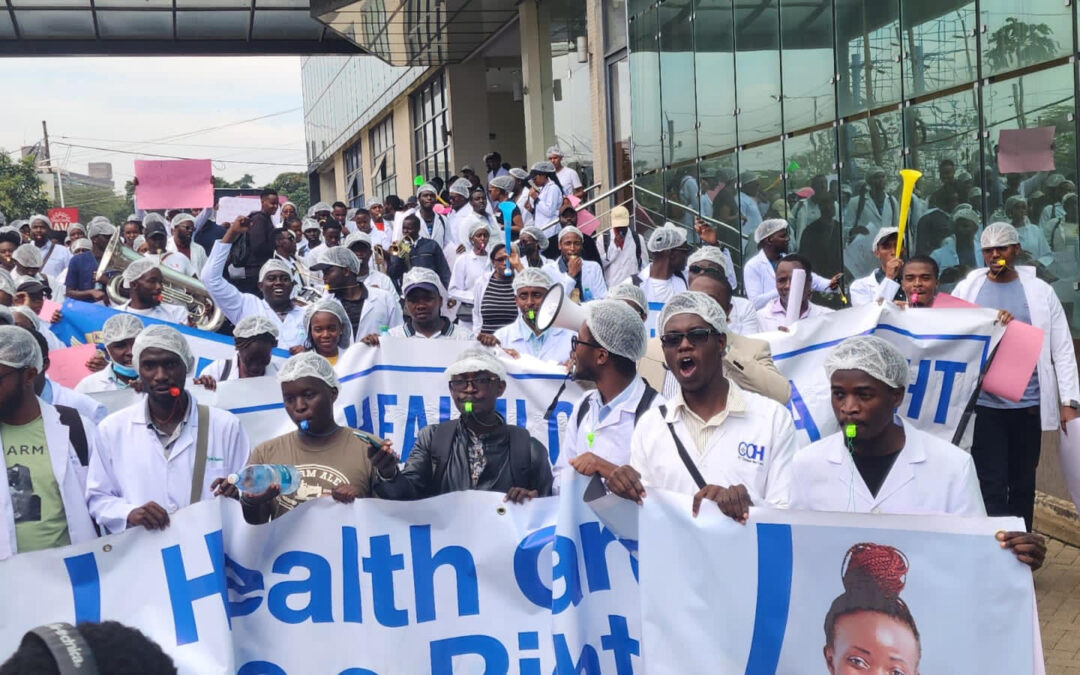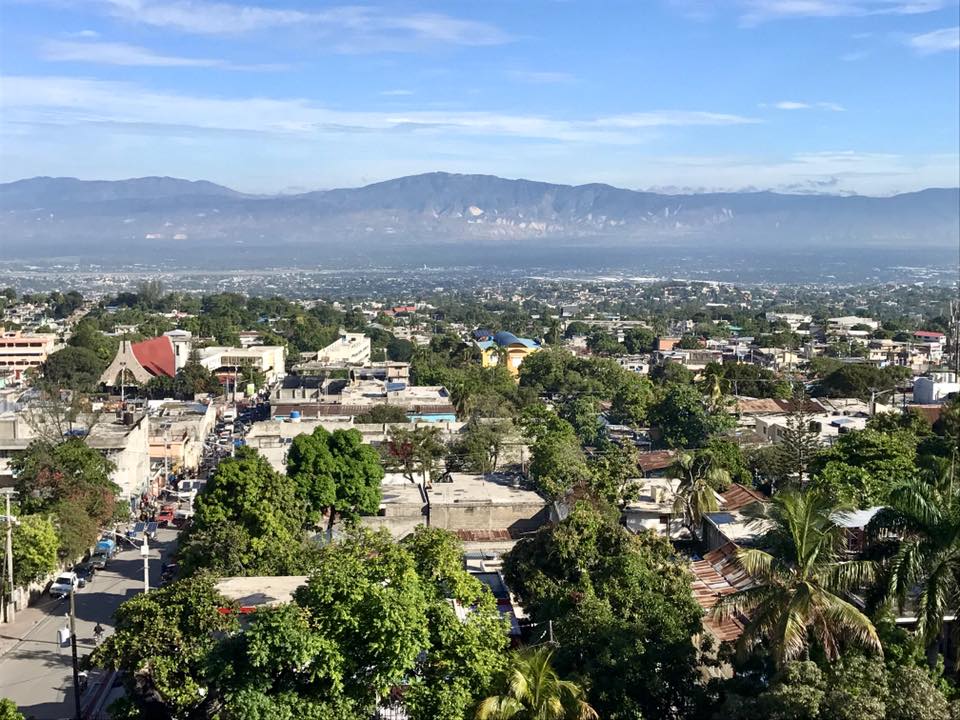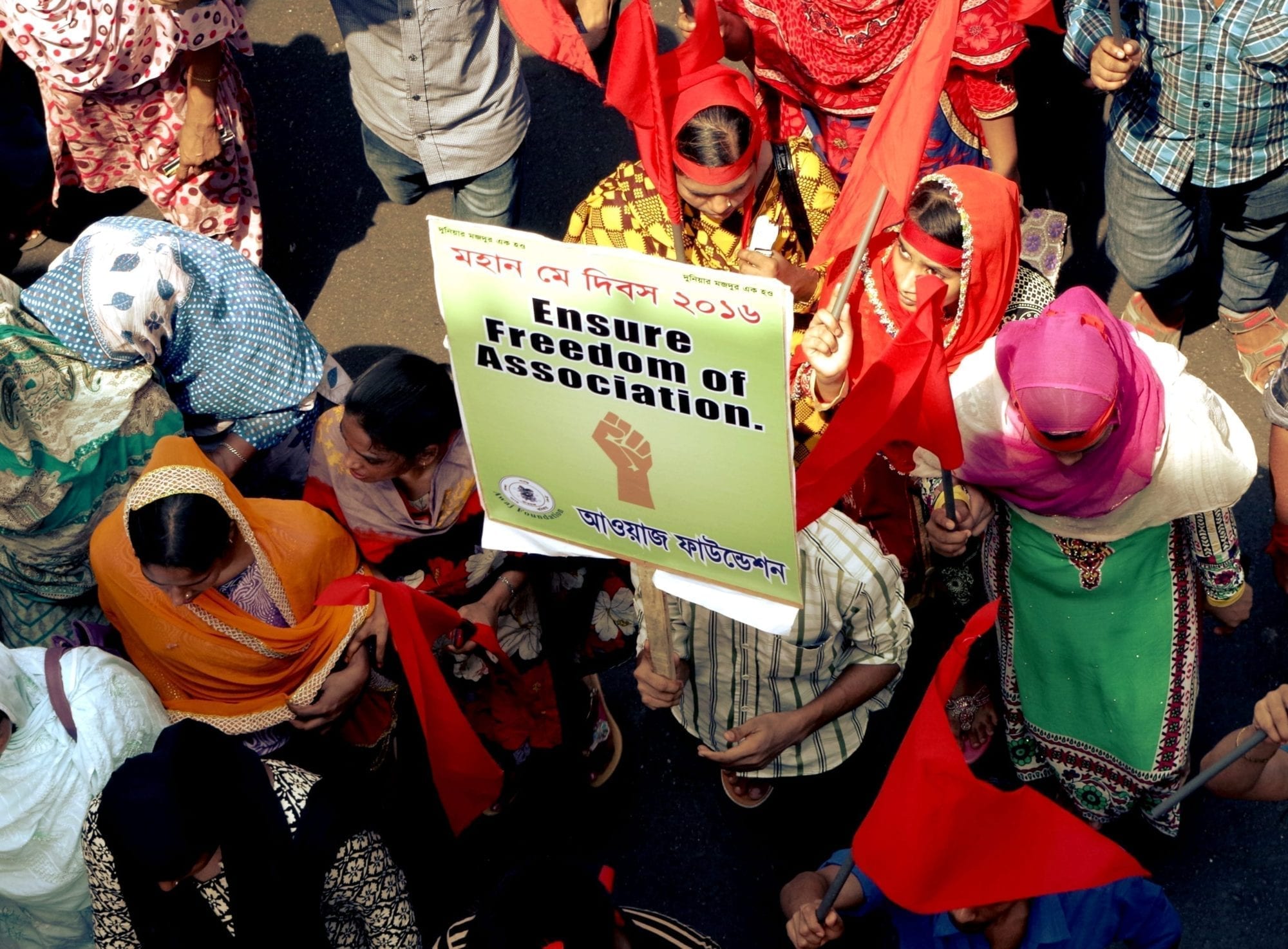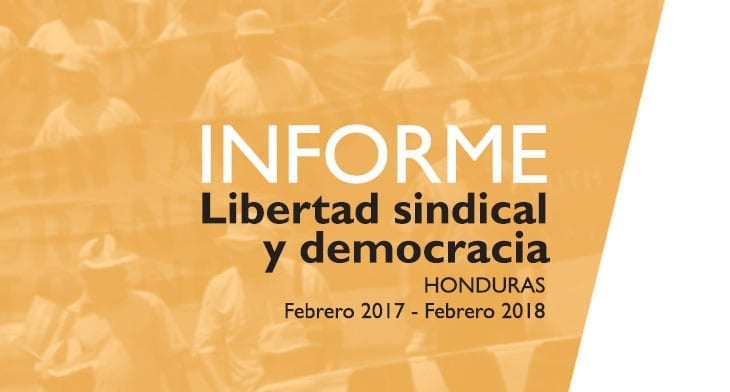
Mar 1, 2024
Yesterday, Dr. Davji Bhimji Attellah, the General Secretary of the Kenya Medical Practitioners, Pharmacists, and Dentists Union (KMPDU), was reportedly attacked by police while leading a lawful demonstration in protest of the delayed posting of over 1,000 medical interns critical to addressing the nationwide shortage of healthcare providers. Additional protesters were seriously injured when the police fired teargas canisters at the assembled protesters, causing a stampede.
Solidarity Center Executive Director Shawna Bader-Blau offered this statement:
“The Solidarity Center stands with our partners in the Kenya Medical Practitioners, Pharmacists, and Dentists Union in strongly condemning excessive and unnecessary force by police on KMPDU Secretary General Dr. Davji Attellah. We must stand firm in our defense of the rights of all workers to peacefully assemble, express their concerns, and engage in protest without fear of this kind of violence and retaliation.
This effort to intimidate and retaliate against workers and their elected leaders must be called out for what it is: a violation of fundamental human rights that are guaranteed by international law and by the Kenyan constitution. Our thoughts are with Dr. Attellah, the other injured protesters and the KMPDU and as we call for those responsible for this attack to be held accountable and brought to justice for their actions.”

Feb 28, 2022
Violence broke out on Wednesday, February 23, as Haitian police opened fire on garment workers demonstrating for higher wages and killed a reporter, according to witness reports. Two other reporters were injured at the scene in Port-au-Prince.
Maxihen Lazzare, who worked for Haitian media group Roi des Infors, died of his wounds at a hospital on Wednesday. Haitian police responded to Lazzare’s death in a press release saying they are launching an investigation and that the police are implicated.
The union coalition released a statement denouncing Wednesday’s violence and condemning “the kind of conspiracy of the police and employers to block the mobilization to force us to accept a minimum wage that cannot meet our needs so that they can continue to suck blood and exploit workers.”
Protests have been ongoing since Haitian workers staged a peaceful demonstration calling for an increase in the minimum wage earlier this month. In January, a coalition of nine trade unions issued an open letter to the prime minister seeking a minimum wage increase from 500 gourdes (about $4.82 a day) to 1,500 gourdes ($14.62). They noted that wages have been stagnant for years while the increasingly high cost of living and rising inflation were eroding workers’ ability to live with dignity.
In response to garment worker demands, the government mandated a new minimum wage earlier this week, bumping pay to about $6.53 a day.
In 2019, the Solidarity Center conducted a wage assessment, with Haitian workers and their unions, and found that garment worker wages then covered less than a quarter of the estimated cost of living.
Unions around the world are pushing back against anti-union violence. Earlier this month labor leaders from several countries stood against anti-union violence in Mexico.

Mar 4, 2019
Even as 11,000 Bangladesh garment workers were fired in the wake of strikes they waged in December and January to protest low wages, many seeking to form unions or take collective action also have been physically threatened, attacked and arrested on trumped-up charges. And union leaders say these employer-directed assaults often take the form of gender-based violence at work.
In testimony provided to the Solidarity Center by garment workers and union leaders, a pattern emerges in which women seeking to form unions or engage in collective action are especially targeted with actions to degrade, demean and intimidate them, and some have suffered physical attacks and rape.
“As we try to form unions, management is hostile against us,” says one garment worker. (Neither workers nor factories will be identified to protect workers against retaliation.) “They threaten me that, what if someone stops me in the road, what can I do as a woman?”
Children Injured in Police Attack on Factory
At one factory where workers walked out on January 7 to demand higher wages, police charged them and threw tear gas into the factory, injuring between 13 and 14 children in the ground floor day care. Managers later “sent out a list of all the mothers with babies and terminated them,” says one worker at the factory. “They did this so that they could close down the day care.”
On the same day, at another garment factory where workers say managers had harassed them ever since they submitted a union registration application in November, police beat workers with rods and sticks and “took away the scarves of women,” threatening to rape them, according to a worker’s eyewitness account.
While Bangladesh employers stepped up attacks directed at women workers during the recent walkouts, they have long used gender-based violence at work as a tactic to intimidate women active in union organizing. In November, hired criminals associated with management and local government officials attacked and raped a woman organizer at a factory in the midst of a campaign to form a union.
Crackdown Amplifies Ongoing Assaults on Worker Rights
The harassment, assaults and arrests of garment workers this year amplifies an increasingly repressive environment for worker organizing that in recent years has included threatening home visits, kidnappings and mass termination.
In one recent example, workers at a garment factory saw their daily production quota increased to 400 pieces a day, up from 250 pieces after they filed with the government for union registration. Workers there say supervisors locked union committee members in bathrooms and hired local criminals to pursue them in the streets.
Even as employers exploit workers’ wage protests as a pretext for infringing on the rights of workers to organize and bargain collectively, government resistance to workers seeking to register unions further represses workers’ efforts to form unions and collectively bargain better wages and working conditions.
Following the deaths of more than 1,200 garment workers in the 2012 fire at the Tazreen Fashions factory and the 2013 Rana Plaza building collapse, workers vigorously organized to form unions and negotiate contracts, as the Bangladesh government and ready-made garment (RMG) employers responded to international pressure to improve safety and wages.
But now Bangladesh, which in 2018 the International Trade Union Confederation (ITUC) ranked as among the world’s 10 worst countries for worker rights, is on the verge of expelling the Accord on Fire and Building Safety in Bangladesh. Established after the Rana Plaza disaster, the legally binding agreement between hundreds of primarily European retail brands and unions conducted safety inspections at more than 1,000 factories and educated workers on safety and other workplace rights.
And without the freedom to form unions and bargain collectively, internationally recognized rights, Bangladesh garment workers are unable to collectively negotiate safer, healthier workplaces.
“We are poor. Just because we formed a union, we have been the victims,” says one worker at a factory where 200 workers were fired after they sought to register a union with the government. The worker says when management learned of their efforts to form a union, women were threatened with rape and men threatened with guns and knives.
“Our photos and fingerprints have been sent to all the factories, so we are not able to find jobs anywhere else. Blacklists are hanging in front of the factories,” she said.

Feb 4, 2019
Two union leaders in Guatemala were imprisoned January 17–28 for negotiating and signing a collective agreement between the union and the Ministry of Health authorities in 2013. Following a hearing, both union leaders were released on parole but placed under house arrest, pending a final decision.

Union leaders say the arrest of SNTSG activists Luis Alpirez Guzmán and Dora Regina Ruano is part of a sustained attack against unions in Guatemala. Credit: PSI
Luis Alpirez Guzmán, general secretary of the National Union of Health Workers of Guatemala (SNTSG), and Dora Regina Ruano, former SNTSG deputy general secretary, were charged with fraud in signing the collective bargaining agreement between the government and the SNTSG.
The arrest of SNTSG leaders highlights “a sustained attack on collective bargaining, freedom of association and the right to organize,” the Trade Union Confederation of the Americas (TUCA) says in a statement. TUCA is a regional body of the International Trade Union Confederation (ITUC).
The international labor community—including the ITUC, TUCA, Public Services International (PSI), Global Nurses United and the Caribbean Confederation of State Workers—is calling on the Guatemala government to drop all charges against the two union leaders and end the repression and harassment of trade unionists, including the prosecution of workers’ gains through collective bargaining. Although the pact was signed in 2013, it has since been suspended, leaving the workers without a contract.
(You can urge the Guatemala government to ensure justice by taking part in an online campaign spearheaded by PSI.)
Guatemala One of 10 Worst Countries for Workers
The number of trade unionists murdered in Guatemala rose to 90 in 2018 since 2004, according to the ITUC, which in 2018 ranked the country as among the 10 worst for workers. The ITUC says Guatemala’s “pervasive climate of repression, physical violence and intimidation” is “compounded by the government’s failure to provide timely and adequate protection to trade unionists who received death threats and to pursue the many historic cases of murders of trade unionists.”
The AFL-CIO and Guatemala and Honduran trade unions in 2008 first submitted to the U.S. Trade Representative a complaint regarding anti-union violence in Central American Free Trade Agreement (CAFTA). The complaint was heard by an arbitration panel in 2015 following Guatemala’s failure to implement an 18-point enforcement plan to address worker rights violations that was agreed to in 2013.
In June 2017, a U.S.-Guatemala CAFTA arbitral panel released its long-delayed decision and ruled against the workers, after the panel hearing the case decided worker rights violations documented in the complaint were not affecting trade. Within three months of the decision, five unionists were shot, two fatally.
The International Labor Organization (ILO) last year closed its six-year investigation of violence against Guatemalan union activists and other freedom of association violations, and called on the government to implement reforms, such as pursuing legislation that adheres to ILO conventions covering freedom of association and the right to form unions, and the right to organize and collectively bargain. Yet workers say with the formal closure of the ILO complaint, it is doubtful
Noting the arrests followed the ILO suspension of its investigation in November, TUCA says the government’s action “seems to indicate a trend toward greater rights violations and an increase in anti-union violence.”

Mar 23, 2018
Two union activists were murdered in Guatemala and one in Honduras, while dozens of others were targets of violence—including threats of murder, kidnapping and stalking—over the past year, according to two reports released this week.
In Guatemala, “where the unionization rate is less than 1 percent, intolerance and violence against workers highlights, precisely, the mechanisms of terror to limit and, in many cases, to ignore those rights on the part of employers,” according to the Annual Report on Anti-Union Violence. The report, by the Network of Labor Rights Defenders of Guatemala (REDLG), found two more instances of violence in this reporting year (February 2017–February 2018) than in the previous period.
Since 2004, 87 union leaders and activists have been killed in Guatemala, one of the most dangerous nations in the world for union rights activists.
In Honduras, many of those targeted in the 39 documented instances of violence were organizing unions or seeking collective bargaining agreements in the agro-industrial palm oil sector in Colón, according to the report, “Freedom of Association and Democracy” by the Anti-Union Violence Network. Both networks are Solidarity Center partners. (The report is available in English, including an Executive Summary, and Spanish.)
Honduran Union Activist Targeted after Report Released

Isela Juárez is among Honduran union activists targeted with death threats. Credit: Anti-Union Violence Network of Honduras
Two days after the report on Honduras was released this week, union leader Isela Juárez, who has received death threats for her worker rights activism, was followed in a high-speed chase by two men on motorcycles before she took refuge inside the San Pedro Sula City Hall. Juárez, president of the Union of Workers of Municipal, Common and Related Services, (SITRASEMCA), also had been honored for her defense of human rights over the weekend.
The report on Honduras finds that 51 percent of the alleged perpetrators are public officials, including the military police, along with municipal authorities who harassed, coerced and fired nine workers to prevent them from forming unions.
Some 100 unionists and other members of civil society took part in the report’s launch, and several people violently targeted for their activism described their experiences. Since the network in Honduras began documenting cases of anti-union violence in 2015, 69 union activists have been targeted with violence, including seven who were murdered.
The report on Honduras also highlights a correlation between increased violence and the growing role of women in union leadership, and documents cases of unionists attacked during the post-election violence as they sought democracy.
In both countries, poverty and extreme poverty is high, with the World Bank estimating that in 2016, 65 of every 100 Hondurans lived in poverty, and 43 of every 100 in extreme poverty. In Guatemala, despite a growing economy, poverty rose to 59.3 percent in 2014.
The U.S. government has declined to consider anti-union violence in Central American Free Trade Agreement (CAFTA) complaints filed by the AFL-CIO and Guatemala and Honduran trade unions.







